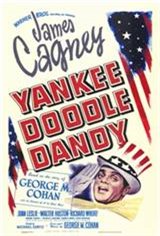Yankee Doodle Dandy

Rotten Tomatoes® Score
![]() 91%
91%
![]() 83%
83%
| In Theaters: |
|
G | 2h 6m | Drama, Musical
Yankee Doodle Dandy is no more the true-life story of George M. Cohan than The Jolson Story was the unvarnished truth about Al Jolson -- but who the heck cares? Dandy has song, dance, pathos, pageantry, uproarious comedy, and, best of all, James Cagney at his Oscar-winning best.
After several failed attempts to bring the life of legendary, flag-waving song-and-dance man Cohan to the screen, Warners scenarist Robert Buckner opted for the anecdotal approach, unifying the film's largely unrelated episodes with a flashback framework.
Summoned to the White House by President Roosevelt, the aging Cohan is encouraged to relate the events leading up to this momentous occasion.
He recalls his birth on the Fourth of July, 1878; his early years as a cocky child performer in his family's vaudeville act; his decision to go out as a single; his sealed-with-a-handshake partnership with writer/producer Sam Harris (Richard Whorf); his first Broadway success, 1903's Little Johnny Jones; his blissful marriage to winsome wife Mary (a fictional amalgam of Cohan's two wives, played by Joan Leslie -- who, incredibly, was only 17 at the time); his patriotic civilian activities during World War I, culminating with his writing of that conflict's unofficial anthem Over There (performed by Nora Bayes, as played by Frances Langford); the deaths of his sister, Josie (played by Cagney's real-life sister Jeanne), his mother, Nellie (Rosemary DeCamp), and his father, Jerry (Walter Huston); his abortive attempt to retire; and his triumphant return to Broadway in Rodgers & Hart's I'd Rather Be Right.
His story told, Cohan is surprised -- and profoundly moved -- when FDR presents him with the Congressional Medal of Honor, the first such honor bestowed upon an entertainer.
His eyes welling up with tears, Cohan expresses his gratitude by invoking his old vaudeville curtain speech: My mother thanks you, my father thanks you, my sister thanks you, and I thank you.
Glossing over such unsavory moments in Cohan's life as his bitter opposition of the formation of Actor's Equity -- not to mention George M.'s intense hatred of FDR! -- Yankee Doodle Dandy offers the George M. Cohan that people in 1942 wanted to see (proof of the pudding was the film's five-million-dollar gross).
And besides, the plot and its fabrications were secondary to those marvelous Cohan melodies -- Give My Regards to Broadway, Harrigan, Mary, You're a Grand Old Flag, 45 Minutes from Broadway, and the title tune -- performed with brio by Cagney (who modifies his own loose-limbed dancing style in order to imitate Cohan's inimitable stiff-legged technique) and the rest of the spirited cast.
Beyond its leading players, movie buffs will have a ball spotting the myriad of familiar character actors parading before the screen: S.Z. Sakall, George Tobias, Walter Catlett, George Barbier, Eddie Foy Jr. (playing his own father), Frank Faylen, Minor Watson, Tom Dugan, John Hamilton, and on and on and on.
In addition to Cagney, music directors Ray Heindorf and Heinz Roemheld also won Oscars for their efforts.
